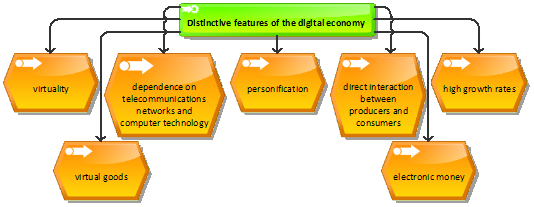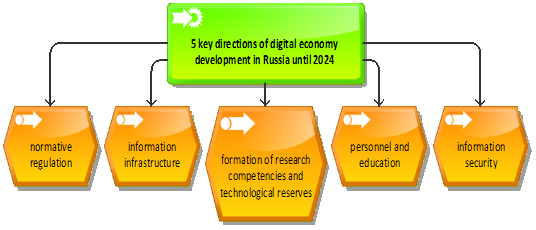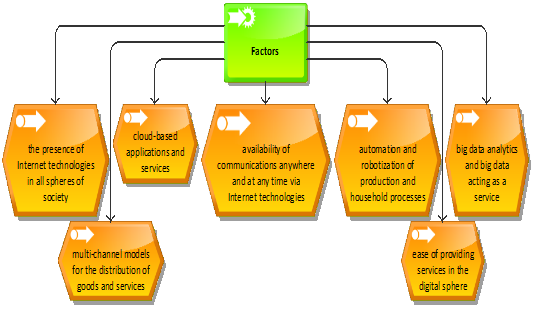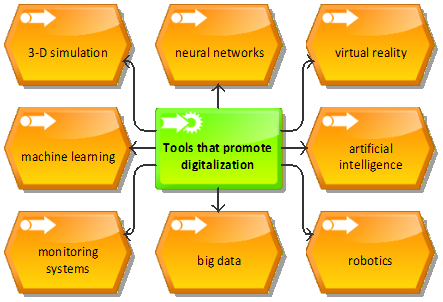Abstract
This article examines the problem of the impact of the digital economy on the economic security of business, and also determines its role and significance in the modern world. The article reveals the importance of timely ensuring the economic, financial and information security of organizations from various threats from the digital economy and digital technologies. Today, this problem is relevant, because with the advent of the digital economy, the economy is being transformed, which leads to the identification of economic security risks associated with the use of digital technologies. The main purpose of this work is to study and analyze the digital economy in relation to the economic security of business, the key tasks of which are: to investigate and analyze the essence of the digital economy, to identify the main trends in the development of the digital economy in the modern world, and to consider the digital economy in relation to the economic security of business. Thus, the article reveals the essence of the concept of "digital economy" from different points of view, assesses the contribution of the digital economy to the Russian economy, identifies the leading areas of the digital economy, and identifies the benefits of digitalization of the economy and the dangers that await in business. Key research and publications on the digital economy and digital technologies in Russia and in the world today can be found on a special website – Digest of the Digital Economy.
Keywords: Digital economy, digital technologies, information, economic security, organization
Introduction
Currently, the success of any business largely depends on the degree of its security, so the problem of economic security of the enterprise is one of the main and important, which must be solved immediately.
It is difficult to design, build, or manage a security system if you do not know what to protect, from whom, and to what extent. Therefore, to build an effective security system, an extensive information infrastructure must work, allowing you to get timely and secure access to information.
Modern information and communication technologies significantly change all social relations, in connection with which it is noted that at present there is a formation of a new information society, which is called the "digital economy". Therefore, today the most urgent problem in the world is the impact of the digital economy on the economic security of the enterprise, and as a result on the information security of the business.
The term digital economy was first used by author Don Tapscott in the book "Digital Economy: Promise and Danger in the Age of Network Intelligence" in 1995. In the age of digital technologies, there is a huge growth of digital platforms, which has led to the integration of the Internet into all spheres of human life (Rogozhina, 2020).
The Government of the Russian Federation developed and approved the Program "Digital Economy in the Russian Federation" until 2035, which includes issues related to the development and implementation of technologies, analysis of "big data" and forecasting, the creation of new ways of management, etc. This program should solve one of the tasks of strategic importance – the preservation of sovereignty against the backdrop of globalization and the implementation of digital development programs with other participants in the world market.
According to the Program, the digital economy is understood as a set of social relations that develop when using electronic technologies, electronic infrastructure and services, technologies for analyzing large amounts of data and forecasting in order to optimize production, distribution, exchange, consumption and increase the level of socio-economic development of states (The Government of the Russian Federation, 2017).
Note the distinctive features of the digital economy in Figure 1 below.

In Russia, there are 5 key directions for the development of the digital economy until 2024 (Figure 2).

In modern conditions, the transition to a digital economy is one of the main priorities of Russia's development, since it is the level of digitalization that shows the competitiveness of both the country as a whole and individual companies in the new technological order.
Digital technologies are accelerating their pace of development. Measures that can make a business more productive and innovative include: reducing costs, investing in basic infrastructure related to doing business, reducing trade barriers, facilitating the entry of new companies into the market, strengthening antitrust authorities and encouraging competition between digital platforms (Rogozhina, 2020).
Figure 3 shows the factors that contribute to the development of the digital economy.

The digitalization of the economy is largely ensured by the automation of all processes and data processing technologies.
To create an information society, use the tools that promote digitalization and integration of all data flows, shown in Figure 4.

Big Data (Big Data) is called " fuel for the new digital economy "(definition from the European Commission's Horizon 2020 program).
The task of Big Data is to store and manage large amounts of constantly updated information.
Big data technologies are widely used by organizations around the world to reduce costs and improve business efficiency.
Big data helps to solve such problems as:
- increase in labor productivity;
- accurate advertising and sales optimization;
- forecasting situations in domestic and global markets;
- improvement of goods and services;
- improved logistics;
- high-quality customer targeting in any business area and others (Urmin & Zageeva, 2017).
Problem Statement
The problem of the impact of the digital economy on the economic security of business is one of the most important and significant in the modern world.
In the course of the study, the theoretical and practical foundations of this issue were considered. This topic is interesting and promising for future research. In particular:
- The role of the digital economy in ensuring economic security;
- Digital economy development;
- The impact of the digital economy on the economic security of business.
Research Questions
In course of the study the following questions were raised:
- What is the role of the digital economy in modern conditions?
- What are the main trends in the development of the digital economy?
- What are the advantages and disadvantages of the digital economy?
- Is there a relationship between the digital economy and business security?
Purpose of the Study
The main purpose of this work is to study and analyze the digital economy in relation to the economic security of business, the key tasks of which are:
- explore and analyze the essence of the digital economy;
- identify the main trends in the development of the digital economy in the modern world;
- consider the digital economy in relation to the economic security of business.
Research Methods
The methodological basis of the research is qualitative general scientific methods, the description of which is published in any sources, for example, " Methods and means of scientific research: studies. manual", written by Kolmogorov in 2017 (Kolmogorov, 2017).
The article uses such methods as the study and analysis of Internet resources and literary sources, observation (research) of trends in the development of the digital economy in the modern world, data description, processing of results in the form of diagrams, tables, diagrams.
Discussion
The research of the digital economy and digital technologies in the modern world is given special importance and this issue is gaining the greatest popularity today. So, for the first time, discussions about the concept of the digital economy appeared at the end of the XX century. during the creation of electronic commerce (Basaev, 2020). In 1994. Don Tapscott, a business consultant and economist from Canada, first coined the term Digital Economy in his book of the same name, Digital Economy. He believed that the main consequences of the digitalization of the economy are a sharp reduction in transaction costs, the creation of new business models and, as a result, the exclusion of intermediaries through direct interaction between the consumer and the supplier (as cited in Tapscott, 1995).
Following Tapscott in 1995, the concept of the electronic economy, which consisted in the transition from processing the atoms that make up the matter of physical substances to processing the bits that make up the matter of program codes, was formulated by Nicholas Negroponte, an American computer scientist from the Massachusetts Institute of Technology (Nicholas Negroponte), which was presented in the book "Being Digital" ("Digital Existence") (Negroponte, 1995). Negroponte believes that the advantages of digitalization compared to the traditional market include:
- the absence of the physical weight of the product, which can be replaced by the information volume;
- significantly lower costs for the production of electronic goods and a smaller area occupied by electronic media;
- the virtual nature of economic relations, leading to a reduction in the need for raw materials;
- the emergence of digital currencies, which today is clearly confirmed by the growing cryptocurrency market;
- instant global movement of goods and services via the Internet (Basaev, 2020).
As can be seen from the context of the article, the researchers pre-determined the main trends of the impact of digitalization on the world, and also gave an impetus to practical implementation in the business space.
The digital economy is represented by three levels, which in their close interaction affect the lives of citizens and society as a whole: markets and sectors of the economy, platforms and technologies, and basic conditions. The last two play the most important role.
For example, according to RAEC analysts, this approach to determining the key areas of state activity is justified, since the expertise and capabilities of the state are much stronger at the basic level, which affects the top markets and industries, with the development of which the business successfully copes.
RAEC also believes that the Internet and digital technologies have penetrated into all spheres of the economy and the lives of Russian citizens today. Runet remains the most active segment of the country's economy, and mobility is the dominant trend, which, together with digital services, increasingly affects a variety of areas of activity.
The contribution of the digital economy to Russia's GDP is large. The four main segments of the industry are marketing and advertising, e-commerce, infrastructure and communications, and digital content. Their total contribution to the country's GDP in 2019 amounted to 4.7 trillion rubles, and by the end of 2020, the Runet economy as a whole (including the mobile economy) reached 6.4 trillion rubles. It is noted that such a breakthrough was associated with the spread of coronavirus infection this year. Despite the crisis, the total growth of the contribution of the four main digital segments to the country's economy by the end of the year will be 15-16%, the RAEC predicted in September 2020 (exact data are currently unknown).
It should be noted that according to the KMDA survey conducted in 2020, the first place among the areas that companies use in their activities belongs to big data. The second place is the Internet of things.
According to KMDA, the average level of digitalization of Russian companies in all industries is 54%. However, over the past few years, a major breakthrough in digital development has been made, for example, by the oil and gas sector, energy, metallurgy and the public sector.
The priority areas of digital transformation of Russian companies are the digitalization of business processes and working with data, as well as the management of customer experience (Zhuravleva & Lavrova, 2020).
One of the goals of the program for the development of the digital economy is to ensure information security. Every month, programmers discover about 12 million new malicious programs. RAEC notes the importance of international dialogue in the field of cybersecurity: at the level of public policy, it is necessary to maintain a balance between ensuring national security and preserving the cross-border and global nature of infrastructures (RAEC Experts, 2017).
To date, the Digital Economy Digest website has been created, which presents key research and publications on the digital economy and digital technologies in Russia and in the world.
The primary reasons for the emergence of risks and threats to economic security are the underdevelopment of the institutional foundations of society, the imbalance of formal and informal institutions, and their low efficiency. At the same time, undeveloped institutions can become the main factor in restraining the pace of digital development and create conditions for the emergence of economic security risks in the context of intensive development of information systems and technological solutions.
Findings
Speaking about the development of the digital economy, it is necessary to consider the impact of the digital economy on the economic security of business.
In fact, they are directly interrelated, since the digital economy is an economic activity based on digital technologies, involving the availability of electronic goods and services produced by e-business and e-commerce. The electronic age. Any problems in the system, leakage of any information entail risks of economic, financial, and information security of the business.
In addition, the digital modernization of traditional manufacturing and service industries, trade and procurement organizations, and related financial and logistics operations creates the basis for the formation of new markets and new market conditions, as well as new approaches to analytics, forecasting, and management decision-making. As a rule, the new always carries great risks (Zakharov, 2020).
The central element on which the entire digital economy is built is information.
Economy + ICT (Information and communication technologies) = Digital economy
Currently, security professionals tend to focus primarily on protecting the confidentiality, integrity, and availability of critical information, as well as ensuring accountability (Plotnikova, 2018).
There is no doubt that the success of a business largely depends on the degree of its security. Therefore, it is extremely important to be able to quickly and regularly implement changes in the information infrastructure. Digital economy technologies model business, as well as processes and management, but people are the key resource for implementing an information security strategy. The direction of development of the digital economy is inextricably linked with education, the development of human resources.
Let us give as an example the methodology of Y. Rasmusena (Rogozhina, 2020), which most clearly reveals the importance of the person. According to its author, the total number of people employed in the economy is divided into three groups: "Knowledge" (high qualification, cognitive complex tasks), "Rule" (average level of qualification, cognitive routine tasks), "Skills" (basic level of education, mechanical tasks)/
A critical indicator for countries with a developed digital economy is the share of employees in the "Knowledge" category, which is 25 % (USA, Japan, Germany, Singapore, UK). Research conducted in October 2017 VSG-group, shows that in Russia only 17 % of specialists (scientists, IT engineers, doctors, teachers, managers) belong to the first group, who have highly developed competencies. The main share (48 %) of employees (accountants, lawyers, office administrators) belongs to the second group and 35% are low – skilled workers (salesmen, security guards, cleaners, drivers, etc.), which at this stage of development does not allow entering the group of countries with a developed digital economy.
Thus, the desire for the development of the digital economy and the implementation of its directions qualitatively transforms the basic resource-human capital. It follows from this that economic security necessarily depends on each individual person, on their contribution, behaviour, attitude to the task, their incentives and motivation, and sources of information (Borzunov, 2014).
Conclusion
Summing up, we note that the digital economy is the activity of creating, distributing and using digital technologies for collecting, storing, processing, searching, transmitting and presenting data in electronic form and related products and services. It is developing rapidly in Russian companies. That is why ensuring the economic security of business in the digital economy is one of the key problems in the modern world. Traditional management methods are fading into the background, and therefore, in order to survive in the digital economy, companies must turn into adaptive systems that allow them to effectively manage a whole range of risks, the main generator of which is a person.
When assessing the scale of digitalization in the modern world, it should be noted that the digital economy can be considered as a rapidly developing segment of the economic system, in which traditional economic relations and business process management models are replaced and supplemented by new electronic technologies of production, exchange and consumption.
Thus, the key essence of the digital economy is to speed up information processing processes, as well as to free employees from routine work.
Any innovation is fraught with both positive aspects that favourably affect the lives of enterprises and people, and negative aspects, risks that need to be taken into account in business.
So, let's look at them. The advantages of the digital economy include:
- reduce costs;
- increase in labour productivity;
- creating new jobs;
- reducing corruption;
- "transparency" of ongoing operations;
- transition to electronic money;
- reduction of errors that depend on the "human" factor;
- freelance development.
In addition, the digital economy has a direct effect on pricing, reducing the cost of goods, works or services. Despite the large number of advantages, in fact, there are a number of dangers from the introduction of digital technologies.
The disadvantages of the digital economy are:
- huge risk of information leakage;
- increase in the number of scammers;
- reduction and complete disappearance of unclaimed professions;
- reduction of employees due to the introduction of robotics in organizations;
- lack of experience and skills of working with the use of new technologies in the staff;
- unwillingness, inability or inability of some categories of citizens to use new technologies in practice (for example, the older generation has difficulty accepting bank cards and refuses to use them);
- the predominance of "machine" thinking over system thinking in children and others (according to the article "Digital Economy" program and its development in the Russian Federation).
Technical and technological, digital and socio-economic development of society generates new and previously unknown risks and threats. Therefore, the issues of ensuring economic security are vital and require close attention and study from a scientific point of view.
References
Basaev, Z. (2020). Digitalization of the economy: Russia in the context of global transformation. https://zen.yandex.ru/media/id/5e8b90d51dc9f04a46c97588/cifrovizaciia-ekonomiki-rossiia-v-kontekste-globalnoi-transformacii-5ea7de3965a8ef41509bd42d
Borzunov, A. A. (2014). The importance of the personnel direction of ensuring the company's economic security in the context of the transition to the digital economy. Innovations and Investments, 11, 113-118.
Kolmogorov, Yu. N. (2017). Methods and means of scientific research: textbook. stipend. Ural Publishing House.
Negroponte, N. (1995). Being Digital. Alfred A. Knopf.
Plotnikova, M. V. (2018). Directions for improving the quality of credit services based on digital technologies. Economic Security and Quality, 1(30), 49-53.
RAEC experts. (2017). Digital Economy of the Russian Federation: expert opinion. Market and analytics. Finam.<url>. https://www.finam.ru/analysis/forecasts/cifrovaya-ekonomika-rf-ekspertnoe-mnenie-20170705-170347/
Rogozhina, N. V. (2020). Digital economy as a factor of strategic development and ensuring economic security. Young Scientist, 41(331), 258-260.
Tapscott, D. (1995). The Digital Economy: Promise and Peril. In The Age of Networked Intelligence, 342.
The Government of the Russian Federation. (2017). Development of the digital economy in Russia. Program until 2035 (No. 1632-r). http://innclub.info/wp-content/uploads/2017/05/strategy.pdf
Urmin, I. B., & Zageeva, L. A. (2017). Big data: big challenges, huge opportunities. Actual problems and Prospects of economic Development: Russian and Foreign experience, 9, 107-110.
Zakharov, D. V. (2020). Digitalization of the economy: problems and prospects. Development of Science, national innovation system and technologies: collection of scientific papers based on the materials of the International Scientific and Practical Conference, 102-107.
Zhuravleva, M., & Lavrova, I. (2020). The digital economy has made a breakthrough. RBC+. https://plus.rbc.ru/news/5fccf4697a8aa9b64bacbaeb
Copyright information

This work is licensed under a Creative Commons Attribution-NonCommercial-NoDerivatives 4.0 International License.
About this article
Publication Date
25 September 2021
Article Doi
eBook ISBN
978-1-80296-115-7
Publisher
European Publisher
Volume
116
Print ISBN (optional)
-
Edition Number
1st Edition
Pages
1-2895
Subjects
Economics, social trends, sustainability, modern society, behavioural sciences, education
Cite this article as:
Mamatelashvili, O., & Kulagina, Z. D. (2021). Economic Security Of Business In The Digital Economy. In I. V. Kovalev, A. A. Voroshilova, & A. S. Budagov (Eds.), Economic and Social Trends for Sustainability of Modern Society (ICEST-II 2021), vol 116. European Proceedings of Social and Behavioural Sciences (pp. 878-887). European Publisher. https://doi.org/10.15405/epsbs.2021.09.02.99

